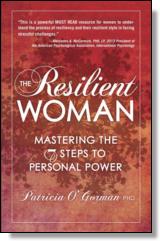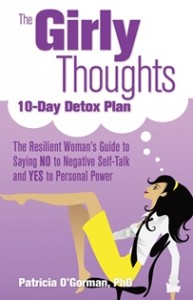By Patricia O’Gorman, PhD
Author of
(publication date 10.28.14)
 The Resilient Woman: Mastering the 7 Steps to Personal Power (2013)
The Resilient Woman: Mastering the 7 Steps to Personal Power (2013)
So Ray Rice says he’s sorry, and it’s all okay? Not so fast.
“Maryland Ravens running back Ray Rice took to the podium for a second time to apologize for the incident that started with him assaulting his then-fiancee and ended in him pulling her unconscious out of an elevator in Atlantic City (http://usat.ly/1y9VnS9).” He then added (for those who questioned her culpability) that she could do no wrong, as if this somehow explained his actions. What’s going on here?
Many things are wrong with this picture—a culture of celebrating and excusing male heroes (women should only be so lucky), a culture of violence against women, and a culture of women being conditioned to accept all of this.
We accept this because of our girly thoughts, that toxic inner dialogue fed into daily by the media and some less-than-helpful female traditions, that tell us to first look to see how we might have caused something terrible to happen to us, and then to be quick to forgive the other if they say the “magic words.”
And those words are not I’m sorry . . . but I love you. If we are loved, we can forgive all. Can’t we? Isn’t that what we are supposed to do?
We have been conditioned by our girly thoughts to accept and excuse apologies if that magic phase is thrown in cause “He loves me.” We have been taught to see past another’s actions and blame his drinking, his anger problem, his stress, his mother, as if this somehow makes it all okay that we have been hurt. In doing this, our girly thoughts teach us not to hold another as responsible for his actions and at the same time to hold ourselves responsible for understanding and forgiving those actions. We psychologists call this a “double-bind.”
Is this the first incident of domestic abuse you’ve ever heard of? No, of course not, and it won’t be the last, unfortunately. But you can help change this:
ü Help women label their girly thoughts when they are in situations where they are explaining away the pain they are in; having a name for what you are feeling gives you power over it. Help those women you know gain power over their pain.
ü Know where local help is available for women caught in domestic violence.
ü Catch your own girly thoughts before they trip you.
Remember being quiet with others and with ourselves when abuse involved is never helpful. If you feel women should be treated better let the NFL know. They are courting your support, your money. Let them know that if they want to consider you as part of their audience, you deserve respect. Say no to your girly thoughts that say love is supposed to hurt. … and while you’re at it…say no way… to the NFL for a 2 game suspension for Rice…!
Patricia A. O'Gorman, Ph.D., is a psychologist in private practice. She is noted for her work on women, trauma, and substance abuse and for her warm, inspiring, and amusing presentations that make complex issues accessible and even fun. She has served as a consultant to organizations across the country in preventative and clinical strategic planning. Dr. O'Gorman is a cofounder of the National Association for Children of Alcoholics, and she has held positions ranging from director of a rape crisis center to clinical director of a child welfare agency, and director of the division of prevention for the National Institute on Alcohol Abuse and Alcoholism (NIAAA). She is a veteran of numerous television appearances, including Good Morning America, Today, and AM Sunday and is the author of eight books including: The Girly Thoughts 10 Day Detox Plan (2014), The Resilient Woman: Mastering the 7 Steps to Personal Power (2013), and Healing Trauma Through Self-Parenting (2012) 12 Steps to Self-Parenting.

 Thoughts 10-Day Detox Plan: The Resilient Woman’s Guide to Saying NO to Negative Self-Talk and YES to Personal Power
Thoughts 10-Day Detox Plan: The Resilient Woman’s Guide to Saying NO to Negative Self-Talk and YES to Personal Power